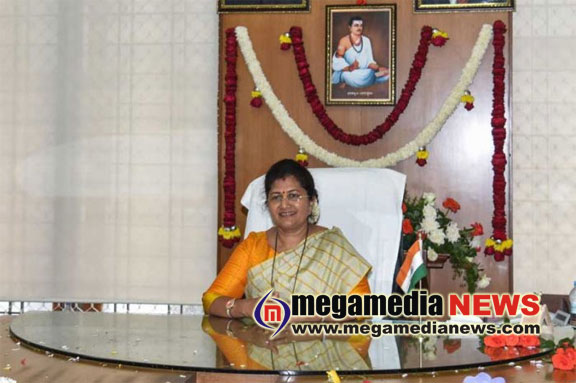Karnataka looking to train women to address malnutrition : Minister Shashikala Jolle
4:00 PM, Friday, August 30th, 2019 Bengaluru : Women and Child Development Minister Shashikala Jolle said Karnataka was looking to train women providing nutrition supplements to anganwadis to tackle malnutrition challenges posed by low hygiene and food quality.
Bengaluru : Women and Child Development Minister Shashikala Jolle said Karnataka was looking to train women providing nutrition supplements to anganwadis to tackle malnutrition challenges posed by low hygiene and food quality.
Responding to DH’s ongoing campaign against malnutrition, Jolle said there was a proposal to train women from the Mahila Supplementary Nutrition Production & Training Centers (MSPTC) “to improve the quality of food production”.
She said the MSPTC would complement various initiatives of the state and central governments to tackle malnutrition. The minister said each MSPTC comprised women aged between 22 and 32 from the most vulnerable sections of the society – widows, destitutes, physically-challenged and members of self-help (stree shakti) groups.
The Department of Women and Child Development promotes MSPTCs for manufacture and supply of food items under the supplementary nutrition programme to beneficiaries of the Integrated Child Development Scheme (ICDS).
The lone woman in Chief Minister B S Yediyurappa’s Cabinet, Jolle hails from Belagavi.
According to this year’s government data, 15% children in the district suffer from stunted growth due to malnutrition. The list was topped by Koppal, Bidar and Raichur from the backward Hyderabad-Karnataka region, where almost one-third of the of the children lacked proper nutrition and were underweight.
“Schemes like Mathrupoorna, Ksheera Bhagya and Srushti have been started with a view to tackle malnutrition,” Jolle said. “In high burden districts of the Hyderabad-Karnataka region, moderately malnourished children are being given egg for an additional three days.”
The minister pointed out that pregnant and lactating women would be provided up to Rs 11,000 under direct cash transfer schemes such as Matru Vandana Yojana and Mathrushree. Jolle said the government was taking steps to address shortcomings in the ICDS.
Jolle said the government was taking steps to address shortcomings in the Integrated Child Development Scheme (ICDS). “Anganwadis are regularly monitored by district and taluk level officials. Bala Vikas Samithis at the anganawadi level are also formed for the purpose,” she said, adding measures such as these are designed to improve local participation in anganwadi affairs
The government, Jolle said, was yet to take a call on the World Bank-sponsored multi-sectoral nutrition project – launched on a pilot basis in Raichur and Kalaburagi districts – that was discontinued recently due to lack of funds.
On the issue of localising food to improve nutrition levels, Jolle said the menu is reviewed regularly. “The menu in the districts is decided locally by the deputy commissioners every year,” she said.
Simillar Posts
Warning: count(): Parameter must be an array or an object that implements Countable in /home/megamcaq/public_html/wp-content/plugins/post-plugin-library/common_functions.php on line 357
- None Found
Leave a Reply
© Copyright 2008 www.megamedianews.com All Rights Reserved. Privacy Policy








 Posted in
Posted in  Tags:
Tags: 



